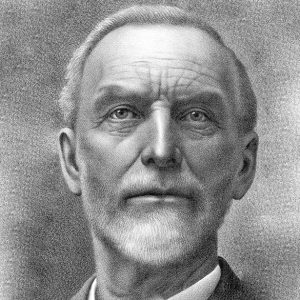calsfoundation@cals.org
Charles E. Cunningham (1823–1895)
During the 1870s and 1880s, Little Rock (Pulaski County) resident Charles E. Cunningham played a leading role in farmers’ organizations and in third-party politics both in Arkansas and at the national level. His political career included third-party nominations for a seat in U.S. House of Representatives, the governor’s office, and the vice presidency. Although he failed to win election to any of these offices, he nevertheless played an important role in building the Union Labor Party in Arkansas, which may well have wrested control of the state government away from the Democratic Party during the late 1880s and early 1890s had Democrats not resorted to election fraud and violence to maintain their power.
Charles E. Cunningham was born on July 1, 1823, in Frederick County, Maryland. His father, a British military captain named James Cunningham, had come to the United States shortly after the War of 1812. James Cunningham married a Maryland native named Catherine Campbell, who bore him four sons and one daughter. By 1834, Charles E. Cunningham was an orphan, but he managed to obtain the standard English and classical education of that era in the schools of Maryland and Virginia. In 1849, he married and found success in freighting and mining in California. In 1854, he moved to Missouri, and at the end of the Civil War, he moved to Little Rock, where he became involved in the lumber business, owning and operating a sawmill and planing mill.
In September 1876, Cunningham presided at a meeting in Little Rock at which the state Greenback Party was formed. He subsequently served as a delegate to the convention in Toledo, Ohio, in February 1878 at which the national Greenback-Labor Party (GLP) was formed, and, as an officer of the Arkansas State Grange, he steered that officially nonpartisan farmers’ group toward supporting the party. In 1882, Cunningham ran as a GLP candidate for the at-large seat from Arkansas in the U.S. House of Representatives, receiving 32.9 percent of the vote in a two-man contest between himself and Democrat Clifton R. Breckinridge. Shortly thereafter, the GLP fell apart in Arkansas and practically everywhere else. Cunningham, however, subsequently became involved with the Agricultural Wheel, a farmers’ organization formed in Arkansas in 1882, and he ran as the Wheel candidate for governor in 1886. He finished third in a three-man race, receiving 11.7 percent of the votes cast.
By 1888, the GLP had been replaced by the Union Labor Party (ULP), which nominated Cunningham that year as the running mate to its presidential candidate, A. J. Streeter of Illinois. This ticket failed miserably at the national level while managing to draw 6.8 percent of the vote in Arkansas. Cunningham subsequently remained active in the Arkansas ULP, which after being defeated by the Democrats in the state elections of 1888 and 1890 by rather undemocratic means, gave way to the People’s (or Populist) Party in 1891–1892. As he had with the GLP and ULP, Cunningham played a pioneering role in the Populist Party, serving as temporary chairman at the first national Populist convention in Cincinnati, Ohio, in May 1891.
Cunningham died on April 21, 1895, and is buried at the Oakland-Fraternal Cemetery in Little Rock. While he fared poorly on the ballot as a third-party candidate throughout the 1880s, no man played a more significant role over a longer period of time in third-party politics in post-Reconstruction Arkansas than did Cunningham.
For additional information:
Barjenbruch, Judith. “The Greenbacker Political Movement: An Arkansas View.” Arkansas Historical Quarterly 36 (Summer 1977): 107–122.
Biographical and Historical Memoirs of Pulaski, Jefferson, Lonoke, Faulkner, Grant, Saline, Perry, Garland and Hot Spring Counties, Arkansas. Chicago: Goodspeed Publishing Co., 1889.
Hild, Matthew. Greenbackers, Knights of Labor, and Populists: Farmer-Labor Insurgency in the Late-Nineteenth-Century South. Athens: University of Georgia Press, 2007.
———. “Labor, Third-Party Politics, and New South Democracy in Arkansas, 1884–1896.” Arkansas Historical Quarterly 63 (Spring 2004): 24–43.
Wheeler, John M. “The People’s Party in Arkansas, 1891–1896.” PhD diss., Tulane University, 1975.
Matthew Hild
Georgia Institute of Technology





Comments
No comments on this entry yet.